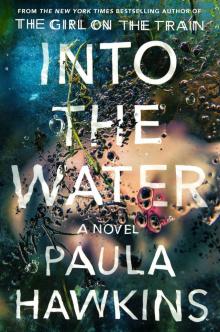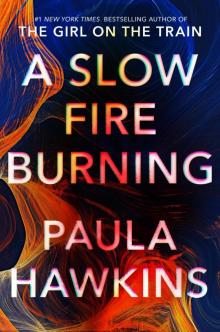- Home
- Paula Hawkins
Into the Water Page 26
Into the Water Read online
Page 26
“Nothing here,” he said over a crackling line.
“Nothing?”
“No one here. There’s a car—a red Vauxhall—but no sign of him.”
“Lena?”
“No sign of either of them. The house is all locked up. We’re looking. We’ll keep looking . . .”
The car is there, but they are not. Which means that they must be on foot somewhere, and why would they be on foot? Car broke down? If he got to the house and he found he couldn’t get inside, couldn’t hole up there—why not just break in? Surely that’s better than running? Unless someone picked them up? A friend? Someone helping him? Perhaps someone might help him out of a tight spot, but we were talking about a schoolteacher, not some habitual criminal—I couldn’t imagine him having the sort of friends who would get involved in a kidnapping.
And I wasn’t sure if that made me feel better or worse. Because if Lena wasn’t with him, we had no clue where she was. No one had seen her for almost twenty-four hours. The thought was enough to make me panic. I needed to make her safe. After all, I’d failed her mother so badly.
I’d stopped seeing Nel after the incident with my father. In fact, I did not spend another moment alone in her company until after Katie Whittaker’s death, and then I had no choice. I had to question her, given her link to Katie via her daughter, given the allegations that Louise was throwing around.
I interviewed her as a witness. Which of course was unprofessional—a good deal of my conduct over the past year could fall under that description—but once I had become entangled with Nel, that seemed to be an inevitability. There was nothing I could do about it.
It felt like grief, seeing her again, because I sensed almost immediately that the Nel from before, the one who had smiled so candidly, who had grabbed hold of me, who had bewitched me, was no longer there. She hadn’t disappeared so much as receded, withdrawn into another self, one I didn’t know. My idle imaginings—a new life, with her and Lena, Helen left contentedly behind—seemed embarrassingly childish. The Nel who opened her door to me that day was a different woman, strange and unreachable.
Guilt spilled out of her during our interview, but it was an amorphous, nonspecific guilt. Nel was still committed to her work, she insisted that the Drowning Pool project had nothing to do with Katie’s tragedy, and yet she radiated culpability, her sentences all prefaced with I should have or We should have or I didn’t realize. But what she should have done, what she didn’t realize, we didn’t seem to get to. Knowing what I know now, I can only imagine that her guilt was about Henderson, that she must have known something or suspected something and yet done nothing.
After the interview, I left her at the Mill House and went to the cottage. I waited for her, in hope more than expectation. It was after midnight when she arrived: not entirely sober, tearful, on the edge. Afterwards, at dawn, when we were finally finished with each other, we went out to the river.
Nel was hyper, manic almost. She talked with the passion of a zealot about the truth, how she was tired of telling stories, she just wanted the truth. The truth, the whole truth, nothing but the truth. I said to her, “You know better than that, don’t you? Sometimes, with things like these, there is no truth to be found. We can’t ever know what was going through Katie’s mind.”
She shook her head. “Not that, it’s not just that, it’s not just . . .” Her left hand gripped mine, her right tracing circles in the dirt. “Why,” she whispered, not looking at me, “does your father keep this place? Why does he look after it the way he does?”
“Because . . .”
“If this was the place your mother came, if this was the place where she betrayed him, why, Sean? It makes no sense.”
“I don’t know,” I said. I’d wondered the same thing myself, but I’d never asked him about it. We don’t talk about that.
“And this man, this lover: Why does no one know his name? Why did no one ever see him?”
“No one? Just because I didn’t see him, Nel—”
“Nickie Sage told me that no one knew who this man was.”
“Nickie?” I had to laugh. “You’re talking to Nickie? You’re listening to Nickie?”
“Why does everyone dismiss what she says?” she snapped at me. “Because she’s an old woman? Because she’s ugly?”
“Because she’s crazy.”
“Right,” she muttered to herself. “Bitches be crazy.”
“Oh, come on, Nel! She’s a fraudster! She claims to commune with the dead.”
“Yes.” Her fingers dug deeper into the soil. “Yes, she’s a con artist, but that doesn’t mean everything that comes out of her mouth is a lie. You’d be surprised, Sean, at how much of what she says rings true.”
“She cold-reads, Nel. And in your case, she doesn’t even need to cold-read. She knows what you want from her, she knows what you want to hear.”
She fell silent. Her fingers stopped moving, and then it came from her—a whisper, a hiss. “Why would Nickie imagine I wanted to hear that your mother was murdered?”
LENA
There was no room for guilt. All the space was taken up with relief, grief, that weird feeling of lightness you get when you wake up from a nightmare and realize it isn’t real. But that—that wasn’t even true, because the nightmare was still real. Mum was no less gone. But at least she didn’t choose to go. She didn’t choose to leave me. Someone took her—and that was something, because it meant there was something I could do about it, for her and for me. I could do whatever it took to make sure Helen Townsend paid.
I was running along the coastal path, clasping Mum’s bracelet to my wrist. I was terrified that it was going to drop off and go sliding down the cliff into the sea. I wanted to put it in my mouth for safekeeping, like crocodiles do with their babies.
Running on the slippery path felt dangerous, because I could have fallen, but safe at the same time—you can see a really long way in either direction, so I knew there was no one behind me. Of course there was no one behind me. No one was coming.
No one was coming for me—not to get me, not to help me. And I didn’t have my phone, and I had no fucking idea whether it was in Mark’s house or in his car or whether he’d taken it and thrown it away, and it wasn’t like I could ask him now, was it?
I’d no room for guilt. I had to focus. Who could I turn to? Who was going to help me?
I could see buildings a little way up ahead, and I started to run harder, as fast as I could. I let myself imagine that someone there would know what to do, that someone there would have all the answers.
SEAN
My phone buzzed in its holder, snapping me back to the present.
“Sir?” It was Erin. “Where are you?”
“On my way to the coast. Where are you? Did Louise have anything to say?”
There was a long pause, so long I thought she perhaps hadn’t heard me.
“Did Louise have anything to say about Lena?”
“Er . . . no.” She didn’t sound convinced.
“What’s going on?”
“Look, I need to talk to you, but I don’t want to do this on the phone . . .”
“What? Is it Lena? Tell me now, Erin, don’t mess about.”
“It’s not urgent. It’s not Lena. It’s—”
“For Christ’s sake, if it’s not urgent why are you ringing me?”
“I need to talk to you the second you’re back in Beckford,” she said. She sounded cold and angry. “You got that?” She cut the call.
The downpour abating, I accelerated, snaking down narrow roads flanked by high hedges. I had that dizzied sense again, like going too fast on a roller coaster, light-headed with adrenaline. I whipped through a narrow stone arch and down a slope, then up again as the road climbed over the brow of a hill, and there it was: a little harbour, fishing boats rising and falling on the impatient tide.
The village was quiet, presumably thanks to the awful weather. So this was Craster. The car slowed without my even registering I was braking. A few hardy walkers draped in tent-like anoraks trudged through puddles as I pulled over to park. I followed a young couple running to take refuge, and found a group of pensioners huddled over mugs of tea in the café. I showed them pictures of Lena and Mark, but they hadn’t seen them. They said they’d already been asked not half an hour earlier by a copper in uniform.
As I walked back to the car, I passed the very smokehouse where my mother had promised to take me for kippers. I tried to picture her face, as I did sometimes, but I never succeeded. I think I wanted to relive her disappointment when I told her I didn’t want to come here. I wanted to feel the pain, her pain then, my pain now. But the memory was too muddied.
I drove on the half mile or so to Howick. The house was easy enough to find—it was the only one there, perched precariously on a cliff top, looking out to sea. As expected, a red Vauxhall was parked out back. Its boot was open.
As I dragged myself out of the car, my feet heavy with dread, one of the PCs came over to give me an update—where they were looking, what they’d found. They were talking to the coast guard. “Sea’s quite rough, so if either of them was in there, they could have been washed quite some way in a short space of time,” he said. “Of course, we don’t know when they got here, or . . .” He led me over to the car and I peered into the boot. “You can see,” he said, “it looks as though someone’s been in there.” He pointed to the smear of blood on the carpet, another on the rear window. A strand of blond hair was caught on the lock mechanism, just like the one found in the kitchen.
He showed me the rest of the scene: smears of blood on the garden table, on the wall, on a rusty nail. I had failed her, like I had failed my mother. No—her mother. I’d failed her like I’d failed her mother. I could feel myself drifting again, the sense that I was losing my grip, and then: “Sir? We’ve got a call. A shopkeeper in the next village up the coast. Says he’s got a girl in there, soaked through and a bit bashed up, no idea where she is, asking him to call the police.”
• • •
THERE WAS A BENCH outside the shop and she was sitting on it, her head tilted back, her eyes closed. She was draped in a dark-green jacket that was too big for her. As the car pulled up, she opened her eyes.
“Lena!” I leaped out of the car and ran towards her. “Lena!” Her face was ghostly white, save for a smear of bright blood on her cheek. She said nothing, just shrank back on to the bench as though she didn’t recognize me, as though she had no idea who I was. “Lena, it’s me. Lena. It’s OK, it’s me.”
I realized when her expression didn’t change, when I held out my hand to her and she shrank away still farther, that something was wrong. She saw me just fine—she wasn’t in shock, she knew who I was. She knew who I was and she was afraid of me.
It brought something back to me sharply, a look I’d seen on her mother’s face once, and on the face of the policewoman, Jeannie, when she took me home. Not just fear, but something else. Fear and incomprehension, fear and horror. It reminded me of the look I gave myself sometimes, if I ever made the mistake of catching my eye in the mirror.
JULES
After Nickie left, I went upstairs to your bedroom. Your bed was stripped bare, so I went to your wardrobe and pulled out one of your coats, caramel cashmere, softer and more luxurious than anything I could dream about owning. I wrapped myself in it and still I felt colder than I had in the water. I lay on your bed for a long time, too stiff and too tired to move, I felt as though I were waiting for my bones to warm up, for my blood to circulate once more, to restart my heart. I was waiting to hear you in my head, but you were silent.
Please, Nel, I thought, please talk to me. I said I was sorry.
I imagined your icy riposte: All this time, Julia. All I wanted to do was talk to you. And: How could you think that of me? How could you think that I would have just dismissed a rape, that I would have taunted you with it?
I don’t know, Nel. I’m sorry.
When still I couldn’t hear your voice, I changed tack. Tell me about Lauren, then. Tell me about those troublesome women. Tell me about Patrick Townsend. Tell me whatever it was you were trying to tell me before. But you wouldn’t say a word. I could almost feel you sulking.
My phone rang and on its bright-blue screen I saw DS Morgan’s name. For a second I didn’t dare pick it up. What would I do if something had happened to Lena? How could I ever atone for all the mistakes I’d made if she, too, was gone? My hand trembling, I answered. And there! My heart pumped again, pushing warm blood to my extremities. She was safe! Lena was safe. They had her. They were bringing her home.
• • •
IT SEEMED AN AGE, hours and hours, before I heard a car door slam outside and I was able to rouse myself, to jump up and throw off your coat and run down the stairs. Erin was already there, standing at the foot of the steps, watching while Sean helped Lena out of his car.
She was wearing a man’s jacket over her shoulders and her face was pale and dirty. But she was whole. She was safe. She was fine. Only when she looked up and her eyes met mine, I saw that was a lie.
She walked gingerly, placing her feet down carefully, and I knew how that felt. Her arms were wrapped protectively around herself; when Sean reached out an arm to guide her into the house, she flinched. I thought about the man who had taken her, about his proclivities. My stomach turned and I tasted the sweetness of vodka with orange, felt hot breath on my face, the pressure of insistent fingers on soft flesh.
“Lena,” I said, and she nodded at me. I saw that what I’d taken to be dirt on her face was blood, flaking from her mouth and chin. I reached for her hand, but she only held herself tighter, so I followed her up the steps. In the hallway, we stood facing each other. She shrugged off the jacket and let it fall to the floor. I bent to reach it, but Erin got there first. She picked it up and handed it to Sean, and something passed between them—a look I couldn’t read, almost like anger.
“Where is he?” I hissed at Sean. Lena was bent over at the sink, drinking water straight from the tap. “Where is Henderson?” I had a simple, savage urge to inflict pain on him, this man who had taken on a position of trust and then abused it. I wanted to grab at him, to twist and rip clean off, to do to him what men like that deserve.
“We’re looking for him,” he said. “We have people looking for him.”
“What do you mean, looking for him? Wasn’t she with him?”
“She was, but . . .”
Lena was still bent over the sink, gulping water.
“Did you take her to the hospital?” I asked Sean.
He shook his head. “Not yet. Lena was very clear that she didn’t want to go.”
There was something in his face I didn’t like, something hidden.
“But—”
“I don’t need to go to the hospital,” Lena said, straightening up and wiping her mouth. “I’m not hurt. I’m fine.”
She was lying. I knew exactly what kind of lie she was telling because I’d told those lies myself. For the first time, I saw myself in her, not you. Her expression was one of fear and defiance; I could see that she was clutching her secret to herself like a shield. You think that the hurt will be less, the humiliation slighter, if no one else can see it.
Sean took my arm and guided me out of the room. Very quietly, he said, “She was adamant that she come home first. We can’t force her to submit to an examination if she’s unwilling. But you need to take her. As soon as possible.”
“Yes, of course I will. But I still don’t understand why you don’t have him. Where is he? Where is Henderson?”
“He’s gone,” Lena said, suddenly at my side. Her fingers brushed against mine; they felt as cold as her mother’s had the last time I touched them.
“Gone
where?” I asked. “What do you mean, gone?”
She wouldn’t look at me. “Just gone.”
Townsend raised an eyebrow. “We’ve got uniforms out looking. His car is still there, so he can’t have got far.”
“Where do you think he’s gone, Lena?” I asked, trying to meet her eye, but she kept turning away.
Sean shook his head, his expression rueful. “I’ve tried,” he said softly. “She doesn’t want to talk. I think she’s just exhausted.”
Lena’s fingers closed around mine, her breath escaping in a deep sigh. “I am. I just want to sleep. Can we do this tomorrow, Sean? I’m desperate to sleep.”
• • •
THE DETECTIVES LEFT US with reassurances they would be back; Lena would need to give a formal statement. I watched them walk out to Sean’s car. When Erin got into the passenger seat, she slammed the door so hard I was surprised the window didn’t shatter.
Lena called to me from the kitchen.
“I’m starving,” she said. “Could you make spaghetti Bolognese again, like you did before?” The tone of her voice, the softness in it, was new; it was as surprising as the touch of her hand.
“Of course I can,” I said. “I’ll do that now.”
“Thank you. I’m just going to go upstairs for a bit, I need to have a shower.”
I put my hand on her arm. “Lena, no. You can’t. You need to go to the hospital first.”
She shook her head. “No, I really don’t, I’m not hurt.”
“Lena.” I couldn’t meet her eye as I said it. “You need to be examined before you can shower.”
She looked momentarily confused, then she dropped her shoulders, shook her head and stepped towards me. Despite myself, I started to cry. She wrapped her arms around me. “It’s OK,” she said. “It’s OK, it’s OK.” Just like you had, that night after the water. “He didn’t do anything like that. It wasn’t like that. You don’t understand, he wasn’t some, like, evil sexual predator. He was just a sad old man.”

 Girl on the Train
Girl on the Train The Girl on the Train
The Girl on the Train Into the Water
Into the Water A Slow Fire Burning
A Slow Fire Burning